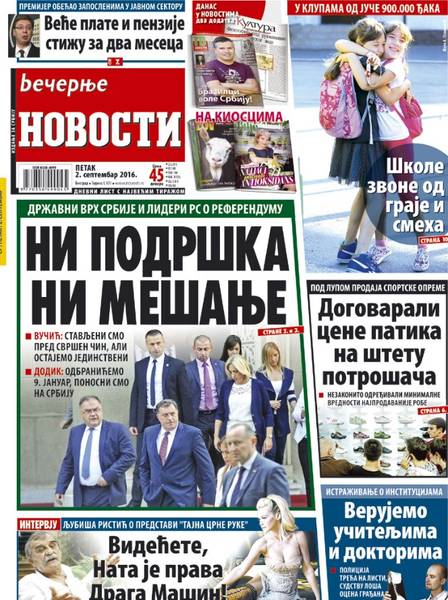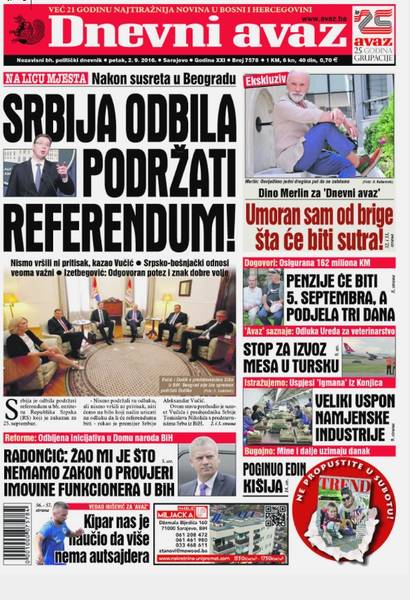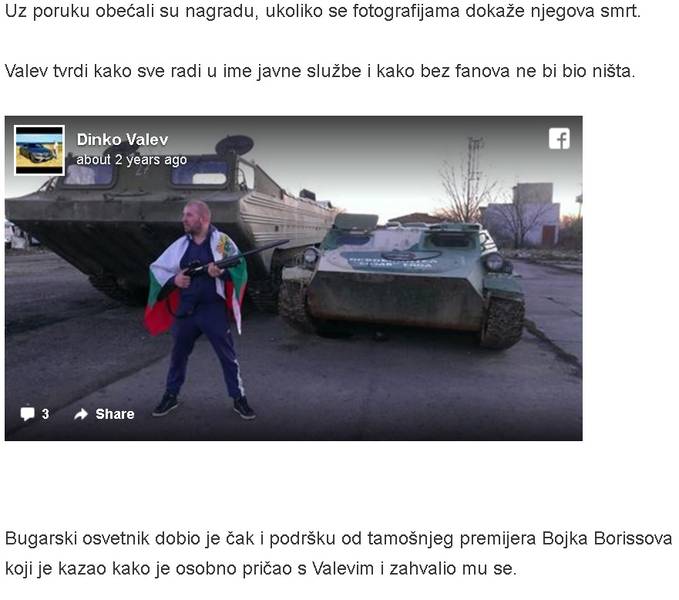Serbia's Lack of Position Calms the Region Down
Adelina Marini, September 2, 2016
Serbia’s Prime Minister Aleksandar Vučić and President Tomislav Nikolić neither backed Milorad Dodik for the referendum in Republika Srpska (RS) in Bosnia and Herzegovina, nor did they denounce it. This became clear after their meeting yesterday with Serbian authorities in BiH regarding the crisis in the Dayton state, created by RS insisting on holding a referendum which January 9 is to be named with an official holiday. The ambiguous decision of Serbia surprisingly received strong support in the region and gave rise to various, generally positive interpretations.
 In Croatia, to Jutarnji list the ambiguity is evident. The newspaper reports, that Nikolić and Vučić did not support the referendum, but reminds that they were not in any way willing to exert pressure in order to change political positions in the country.
In Croatia, to Jutarnji list the ambiguity is evident. The newspaper reports, that Nikolić and Vučić did not support the referendum, but reminds that they were not in any way willing to exert pressure in order to change political positions in the country.
The other major Croatian national daily newspaper Vecernji list centred on the meeting of the Serbian Prime Minister with the Croatian member of the BiH presidency Dragan Čović, according to whom the RS referendum will change nothing. “We did not back the decision, but we exerted no pressure either, neither will we influence the decision whether to have a referendum or not”, is the newspaper’s quote of Vučić from his joint press conference with Dragan Čović. “Absolutely nothing will change on September 26 … we are going too far into exaggerated pressure - I would not say on trivial matters, so as not to offend those, who want to set up a date, for every community in BiH and Serbia has its day, regardless whether at the municipal or other level of power”, commented Mr Čović.
Vecernji also quotes the Croatian foreign minister, who commended the position of official Belgrade for being a positive and constructive one. “It is very important that the state summit of Serbia behaved in a sensible and constructive manner”, remarked Mr Kovač, and his words were quoted in almost all Serbian media. Belgrade’s decision was also hailed by the leader of the BiH presidency, Bakir Izetbegović. Quoted by the Bosnian website Klix, he expressed confidence that protecting order in BiH is in both BiH's and Serbia’s interests.
Vecernji also publishes today a commentary by Zoran Krešić, entitled "Symptoms of a severely ill patient”. “The state, created in Dayton shows every symptom of a severely ill patient, sabres are rattling, and dangers for the region’s stability are being created”, writes the author. “The RS referendum, which challenges the ruling of the Constitutional Court, finally brings out in the open what everyone already knows”, writes Zoran Krešić, “and SDP leader Zoran Milanović describes in two sentences ‘Big s—t’ – BiH is not a serious state, not a state at all, because Serbs, Bosniaks, and Croats all have different visions for the future of this country, which is getting less and less support by the mentors of the experiment, conducted in the Dayton laboratory”, continues the commentary.
"The holding of this referendum, according to many evaluations, could either be the start of a new tangle in BiH and the region, or a final disentanglement, because none of the peoples is content with the current situation in BiH”, concludes his commentary Zoran Krešić.
Serbian media, in general, just note yesterday’s decision of Serbian authorities. Danas, however, chose to pull forward as headline a quote by the Serbian PM, which I saw nowhere else: “We will do everything not to repeat 1991”. He said this in response to the commentary of the leader of the Serbian Democratic Party in BiH Mladen Bosić, who said that many of the current events reminded him of the year 1991 (when the war in former Yugoslavia began).
 "Shopping with Dodik" is the headline of a commentary in the Bosnian daily newspaper Dnevni Avaz. “Until today, he [Dodik] had it all. Now it is all crumbling down for him like a house of cards”, reports the newspaper. “The world fluttered around him, begged him, sent half-threatening messages to him, offered him gifts ... He looked at all this from aloft and discarded it all. The referendum for the famous Day of RS was at the door, triumphant victory at the upcoming local elections came to him in the brief night dreams, he kept convincing himself that his voice never sounded better when singing under the tent. Now all this is disappearing. Serbia turned her back on him”, continues Dnevni Avaz.
"Shopping with Dodik" is the headline of a commentary in the Bosnian daily newspaper Dnevni Avaz. “Until today, he [Dodik] had it all. Now it is all crumbling down for him like a house of cards”, reports the newspaper. “The world fluttered around him, begged him, sent half-threatening messages to him, offered him gifts ... He looked at all this from aloft and discarded it all. The referendum for the famous Day of RS was at the door, triumphant victory at the upcoming local elections came to him in the brief night dreams, he kept convincing himself that his voice never sounded better when singing under the tent. Now all this is disappearing. Serbia turned her back on him”, continues Dnevni Avaz.
“Politics is crueler than war. In war there are front lines and things are quite simple”, further says the edition’s commentary. “There are no such things in politics, however ".
Croatia prepares for a new wave of refugees
Croatian media keep commenting the possibility of the unleashing of a new refugee wave, should the EU’s agreement with Turkey fail. In an analysis for the online edition Index, Vojislav Mazzocco writes that in October, when Turkey is expected to receive or not its visa relief, migrant pressure towards Europe could increase. What could save the continent is the upcoming winter. The author says that Croatia is currently preparing intensively for a new wave of refugees, for their accepting and accommodating. Policemen in Slavonia have been ordered to return earlier to regular duty from the seaside, where they helped uphold the order because of the consecutive tourist records in the country.
Vecernji also reports, that the country is preparing for a new wave, but with a different focus – “Croatia is the only one along the route, which is against raising fences along the border”, is the headline of the newspaper, which reports that Croatia has no intention of raising wire fences, should things come to a new migrant flow, and this position is shared by both largest political parties in the country – HDZ and SDP. HDZ, however, stresses on “yet”. It is one of the leading subjects for the state TV channel HRT. In the show Croatia Live, Dr Drago Župarić-Iljić from the Institute for Migration and Ethnic Studies stated that everything depends on high-level politics. Should Turkey decide to let through the refugees, it is very probable that among the Syrians and Afghanis there will be Turkish nationals, opponents of the Erdoğan regime. In his opinion, the largest challenge is the process of integrating the refugees, who decide to stay in Croatia and in this sense he recommends that Croatia requests as much funds as possible from the EU.
Croatian elections and Serbia
An interesting comparison is being made currently in Croatia between the new HDZ leader Andrej Plenković and his hapless predecessor Ivo Sanader, who was the first Prime Minister in the region to be sentenced to prison for corruption. Vlatka Polšak Palatinuš writes for the online edition tportal, that at the moment the Serbian government in Belgrade is keeping its fingers crossed for an HDZ win, headed by Plenković and asks whether this is not a re-run of the Sanader scenario, where Ivo Sanader opened no front lines with Serbia and formed a government with representatives of the Serbian minority, giving them a Deputy Prime Minister’s chair. tportal spoke to political analyst Boško Picula, who agrees that Serbia would like it if Croatia was headed by Plenković, rather than the leader of the People’s coalition Zoran Milanović, due to the negative experience they had with Milanović’s government last year.
Such support would be a disservice to the HDZ, for it makes it look like the SDP is the most intensive one in guarding the national interest, thinks Picula. Anđelko Milardović of the Institute of European and globalisation studies, however, disagrees with the parallels between Plenković and Sanader. “Plenković has some particularities, which are based on dialogue, tolerance, and cooperation. He cannot be compared to Sanader”, says the analyst. Plenković is a combination of a newly-hatched politician and a bureaucratic conservative, formed abroad, he adds.
"Picturesque Dinko"

This is the headline of an article in Jutarnji list, dedicated to the Bulgarian “hero” Dinko Valev. The newspaper reports that ISIS has announced a 45 000 euro bounty on the head of the Bulgarian “migrant hunter”, who tracks refugees along Bulgaria’s border with Turkey. The newspaper tells of Dinko’s adventures, using photos from his Facebook profile, as well as of the fact that he became so popular in Bulgaria that he managed to buy an expensive Mercedes S-klasse and got invited to participate in the Big Brother reality show. He even got support from Prime Minister Boyko Borissov. The newspaper does, however, remind that Dinko’s actions were condemned by the Helsinki Committee for Human Rights, which named his group a “paramilitary formation”.
Translated by Stanimir Stoev
 Bakir Izetbegovic, Andrej Plenkovic | © Council of the EU
Bakir Izetbegovic, Andrej Plenkovic | © Council of the EU Aleksandar Vucic, Recep Tayyip Erdogan | © Serbian Presidency
Aleksandar Vucic, Recep Tayyip Erdogan | © Serbian Presidency Jean-Claude Juncker, Zoran Zaev | © European Commission
Jean-Claude Juncker, Zoran Zaev | © European Commission